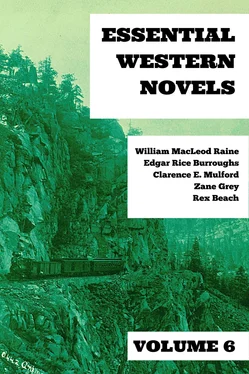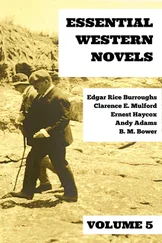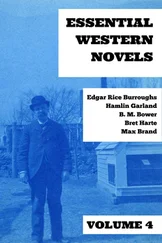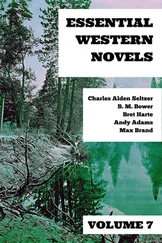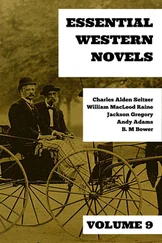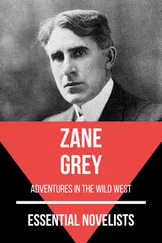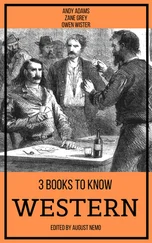"Squaw-man" is the name given to a white man who has married one or more Indian wives, and been regularly adopted by their tribe with whom he lives. With the exception of being of occasional use as an interpreter, he is an utterly worthless person. He has completely left his own race and taken to the ways of the savage, and is equally despised by the whites and by his adopted brethren. Many of the woodcutters who supply fuel to steamboats on the upper Missouri marry, or rather buy, Indian wives; but they do not form part of the tribal family, as does the "squaw-man." Often it is policy for them to take wives from tribes which are dangerous to their safety. A wife insures protection from the depredations of her tribe; and when her lord and master is tired of her, or wishes to form other business relations, he simply tells her and her progeny to go home. These men have the reputation of being most active agents in supplying ammunition to the Indians.
At the border of the British possessions, sometimes on our side and sometimes to the north, are several thousands of half-breeds who seem descended from French and Scotch fathers. They speak Cree and some of the other Indian tongues, but customarily use a French patois which is easily understood. Their government seems to be founded on the old patriarchal system. They are strict Catholics, and are duly married by a priest, who makes occasional visits to them, and insists upon legally uniting in wedlock such couples as he thinks have proved this ceremony to be necessary. They lead a nomadic life, trading between the whites and the Indians, supplying the latter with ammunition, subsisting mostly on game and buffalo. The latter they make up into pemmican,—a large bundle of finely chopped fat and lean, seasoned with wild herbs, and tightly wrapped up in buffalo-hide. This they sell, or keep for winter use. They travel in curious one-horse carts, in the manufacture of which little or no iron is used, the pinning being done with wood, and the wheels bound together with thongs of green buffalo-hide, which shrink as they dry. As these carts will float in water, an unfordable stream can be crossed by swimming the horses attached to the shafts. These people always camp with their carts in a circle, the shafts towards the centre, and the carts prove an effective barricade against any enemy without cannon. Their stock is corralled every night inside the circle. These half-breeds must be classed more as Indians than as whites, as their actions, habits, and beliefs are inherited more from their mothers than from their fathers.
A great and always remunerative pursuit on the frontier is that of cattle-raising. A well-selected range, near streams which do not dry up in summer, and with timber, or such undulations of the ground as would afford shelter for the beasts from the worst winter's winds, together with a small capital and reasonable care and exertion, will in a few years produce a fortune,—and not only a fortune, but robust health for the herder. The season when he is away from his cabin, herding up his cattle, is mild enough to allow sleeping on the ground. He is not compelled, like the soldier, at times to endure the blizzard or to sleep in the snow. Many young men engaged in cattle-raising are of excellent education and social position, and very much attached to the life they lead; and well they may be, as it gives them all the pleasure the frontier can afford with no more hardship than is good for them. Choosing congenial companions, they build a comfortable ranch, stock it well with books, and employ men to assist in the rougher duties, either by hiring them with fixed wages or giving them an interest in the herd. The day is passed in the saddle, the evening before a crackling wood-fire. The only time when great exertion is necessary is during the "roundings up"; then their whole property in cattle must be brought together, the young calves branded, and the brands of their parents retouched if effaced. There is no animal near by powerful enough to destroy cattle, and there is nothing to prevent their yearly increase. The Indians may kill one now and then for food, but cannot drive them off, as their movement is too slow. Cattle-stealing is not so easy as horse-stealing.
All these frontier folk eat, drink, and live, and after their manner enjoy life. We can perceive that they have occasional hardships, but they have pleasures which may not be so easily understood by people who live in comfortable houses, and drive in well-hung and well-cushioned carriages, or walk paved streets. A life in the open air, freedom from restraint, and a vigorous appetite, generally finding a hearty meal to satisfy it, make difficult a return to the humdrum of steady work and comparative respectability. They have their place in the drama of our national life, for better or for worse, and their pursuits and character must be recognized and studied by any one who would comprehend our great Western country.


By Clarence Edward Mulford
––––––––

THE TRAIL CALLS
Memory's curtain rises and shows a scene softened by time and blurred by forgetfulness, yet the details slowly emerge like the stars at twilight. There appears a rain-washed, wind-swept range in Montana, a great pasture level in the center, but rising on its sides like a vast, shallow saucer, with here and there a crack of more somber hue where a ravine, or sluggish stream, lead toward the distant river. Green underfoot, deep blue overhead, with a lavender and purple rim under a horizon made ragged and sharp by the not too distant mountains and foothills. An occasional deep blue gash in the rim's darker tones marks where some pass or canyon cuts through the encircling barriers. A closer inspection would reveal a half-dozen earthy hollows, the rutting holes of the once numerous buffalo which paused here on their periodic migrations. In the foreground a white ranchhouse and its flanking red buildings, framed by the gray of corral walls, nestles on the southern slope of a rise and basks in the sunlight. From it three faint trails grow more and more divergent, leading off to Everywhere. Scattered over the vast, green pastures are the grazing units of a great herd, placid and content, moving slowly and jerkily, like spilled water down a gentle, dusty slope. But in the total movement there is one thread with definite directness, even though it constantly turns from side to side in avoiding the grazing cattle. This, as being different and indicating purpose, takes our instant attention.
A rider slowly makes his way among the cattle, by force of habit observing everything without being fully conscious of it. His chaps of soft leather, worn more because of earlier associations than from any urgent need on this northern range, have the look of long service and the comfort coming from such. His hat is a dark gray sombrero, worn in a manner suggesting a cavalier of old. Over an open vest are the careless folds of a blue kerchief, and at his right hip rubs a holster with its waiting, deadly tenant. A nearer approach reveals him to be a man in middle life, lean, scrupulously neat, clean shaven, with lines of deep humor graven about his eyes and mouth, softening a habitual expression which otherwise would have been forbiddingly hard and cynical.
Читать дальше
